Note Update 2018: Volcano Island Honey changed owners and is now called Rare Hawaiian Honey Company. They do not offer tours like the one I did here, but they still do sell their wonderful honey!
Can honey make the world a better place?
Prior to traveling on the Big Island my answer to that question was most definitely “Huh? ” most likely followed by “No.” However, after meeting Richard of the Volcano Island Honey Company, spending hours talking to him enthralled with every piece of information that came from his lips – my answer is now an enthusiastic “Yes!”
I am hopelessly lost trying to find the sign for Volcano Island Honey and as usual I am running late. The drive here is distracting me with it’s beauty and I think to myself that this isn’t a bad place to be lost on the winding tree lined roads of Old Mamalahoa Highway near Honokaa.
Table of Contents
Organic Honey on the Big Island
Finally I see the turn off and it takes me deeper into the maze of private farms; at the end of the road I see the sign leading me to honey. I’m here to meet Richard Spiegel, a beekeeper who is leading the way in organic honey production. I have a dream of dawning a bee suit and seeing the hives, but Richard has agreed to fit me into his busy schedule, so I am simply thankful that I’m able to meet him at all.
Richard wears a wide brimmed floppy hat, has a gray beard, and a welcoming smile. He leads me into a meeting room where I learn he holds presentations for various groups including students, tourist, media, and the neighborhood also uses it for a community meeting space. Richard gets me some tea and of course offers me honey. I accept and he brings out a jar of his honey, twists open the lid, and sets it next to my tea.
Rare Organic Honey Only On the Big Island
This is like no honey I’ve ever seen before. It’s cream colored and thick like frosting or a butter spread. I try a little directly from the spoon out of curiosity. It’s his rare organic white honey and even though it doesn’t look like honey to me, it tastes like honey; it has a delicious sweet flavor.
From Attorney to Beekeeper
I’m eager to learn about his honey production. However, when he starts telling me about his journey from attorney to beekeeper all of a sudden I realize that maybe my real interest is not honey, it’s his story from traditional career to finding and following his passion which interests me. His views on business and life have captured me and I can’t agree with him more.
He describes himself as a retired hippie. He started as a lawyer participating in the civil rights movement, and ended up in a VW van traveling across the US to live an ‘alternative’ lifestyle. He wanted to show people that there’s another way to ‘do it’; ‘it’ meaning life in general.
I consider the fact that fate maybe brought us together. He was out preaching my way of life way before I was born. We begin to chat feverishly about our views of work, life, and of course career breaks and travel. I am delighted; yet we haven’t once discussed honey.
After a long, fun diversion, we get back on track and he begins to show me a slide show about his business and the business of bees. His hobby had been bee-keeping and when he moved to the Big Island he decided to use the bees as a way to change people. He wasn’t really interested in starting a business, but he wanted to see if it was possible to succeed in business based on values.
Bees are Complex…and Really Fascinating!
Richard next began to introduce me to the complexities of bees; the information he provides me is practically unbelievable.
• 1 colony contains over 50,000 worker bees – all female
• The queen bee can live for 3 or 4 years
• 1 colony can make 60 pounds of honey a week
• All bees in a colony have a specific role
• Bees fly 2 miles from the hive searching for nectar to make honey and when they find it they fly back and do a specific figure 8 dance to tell the other bees where the nectar is located.
The sheer thought of how a bee can communicate complex geographical coordinates of a 2 mile radius without speaking is about too much for me to comprehend. Richards describes the whole process of bee hives, pollination, and honey production as a four dimensional chess game.
It’s All About the Kiawe Trees
I examine the prize jar of honey further as Richard continues to tell me about organic honey production at the farm. What makes this smooth, silky, mixture which is in front of me so unique is the way the bees are handled, and the way which the honey is produced. The first key is the honey is produced from pollen which comes only from one plant; the exquisite nectar of the Kiawe flower in its most natural form. Instead of the bees finding the pollen around them, Richard takes the bees to the kiawe grove so that it’s the only pollen to choose from. You can learn more about the process and why kiawe trees are used here.
The rest of the process is complex but Richard and his team of bee lovers are coming up with ways to lead the production of truly organic honey. As I listen to him talk I realize honey is not at all what I thought it was. Instead honey production is a true science. To get the rare organic white honey it takes into account things like purity, timing, crystallization, heat, enzymes, and filters.
The Bee Green Initiative
In the same vein in which Richard struck out of the corporate world to show people there’s ‘another way to do it’, he revolutionized honey production too. Volcano Island Honey has gone as organic and environmentally sustainable as they possible can. From organic beeswax foundation, to the jars they use, to the paper they print on, to the fuel they use for their vehicles; Richard is making the world a better place and teaching people to accept and embrace different ways to produce honey. He calls it his Bee-green initiative.
I tour the farm and we talk for hours about bees, honey, the world, careers, passion, and life. My trip to Volcano Island Honey is more than I ever expected it to be. It is different, surprising, and educational; but the best part is that I met a kindrid spirit in Richard.
Richard is “interested in changing the world in a more positive way.” He’s doing it through bee keeping and in my opinion he’s been quite successful. His honey is on shelves all around the world. He uses his famous honey to get into the hearts and minds of people, planting seeds of change inside people.
He may actually be a retired hippie, but he’s succeeding at making the world a sweeter place.

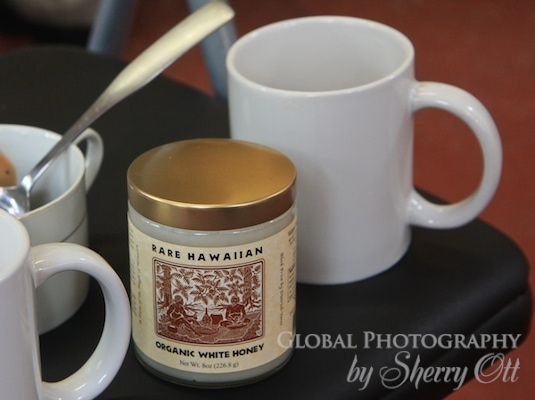


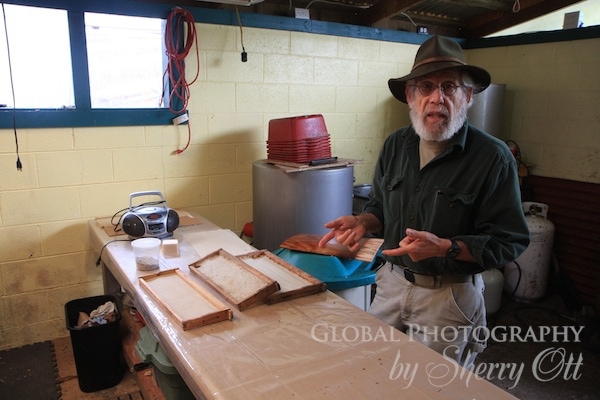
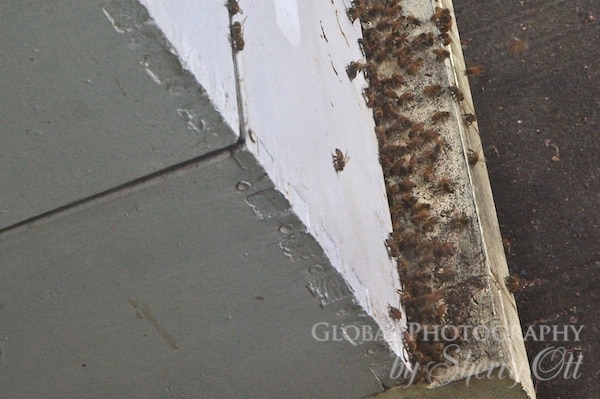
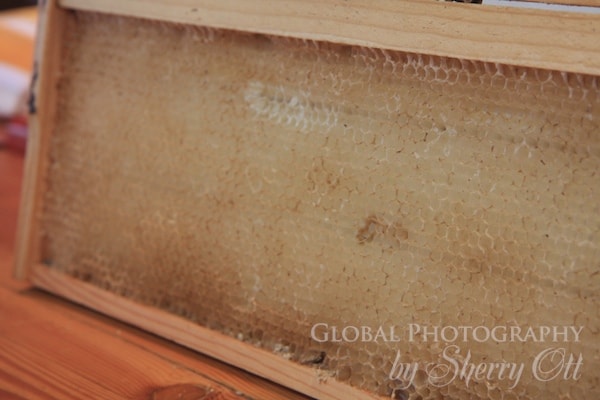

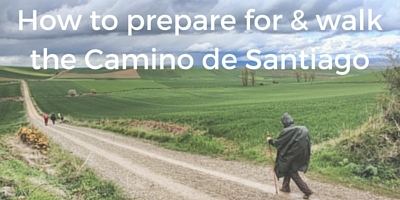



By Marilyn Terrell January 24, 2012 - 6:58 am
Nice post, Sherry! My husband always seeks out beekeepers on our travels and tries new honey. They’re all so different.
You might like this Mexico honey story in the Jan/Feb issue of National Geographic Traveler: http://travel.nationalgeographic.com/travel/countries/mexico-honey-traveler/
By Sherry January 25, 2012 - 3:22 pm
Thanks Marilyn! I’m completely new to the world of honey and bees – but it’s fascinating! Thanks for sending the NatGeo story!
By Barbara Weibel January 24, 2012 - 9:49 am
I love honey and buy it wherever I go.
By Sherry January 25, 2012 - 3:23 pm
Yes – it can be used for so many things!
By Scott January 24, 2012 - 11:45 am
It is always inspiring to read about ‘another way to do it’. Thanks for the post. Great work!
By Lane January 24, 2012 - 11:49 am
After a visit to Honeyville near Durango, Colorado, I became a whipped honey convert. We’ll definitely put this on our list for our next visit to Hawaii.
By Mark H January 24, 2012 - 3:28 pm
My favourite honey fact is that natural honey NEVER goes off and contains no cholestrol or fat. They are meant to have found honey from ancient Egypt that is still edible today. But not the creamed version for me – keep it runny.
By 50+ and on the Run January 25, 2012 - 7:49 pm
As a “recovering attorney,” I love stories like this. Thanks for sharing it.
By JoAnna January 26, 2012 - 2:17 pm
Love this! Honey is super underrated. I wish there was more honey tasting in travel, just like there is an emphasis on beer, coffee, chocolate, wine, etc.
By Lori January 26, 2012 - 3:37 pm
I Love Honey…I usually go to farmer’s markets looking for different flavor’s of honey to buy. I will have to check out the farm next time I am on the big island.
By Doug Cole January 27, 2012 - 12:29 pm
Good article. We are also implementing honey into our ag-tourism based business at http://www.marblemountainranch.com We are producing lavender honey via our organic lavender fields. The honey, lavender, herb products make a nice addition to our gift shop offerings and nicely complement the prime product of an adventure holiday at a dude ranch. Thanks for the good lead, Doug
By Elizabeth | Cheap accommodation February 12, 2012 - 10:59 pm
That white honey looks incredible!
By A Cook Not Mad (Nat) August 9, 2012 - 9:15 am
So glad you discovered the world of bees. I’ve been studying their biology and beekeeping (will hopefully be done this year), they are so fascinating. Here is a post I wrote about them this summer. http://www.acooknotmad.com/2012/06/i-hate-bees.html
By Ann April 16, 2014 - 1:13 pm
I guess you were taken in by this excellent marketer from NYC. This honey is neither rare nor white (Kiawe is one of the most common trees in the world, not indigenous to Hawaii; the honey is white because it is “whipped”…any honey will become white with this treatment.)
A better find would’ve been to visit Big Island Bees “bee museum” in Captain Cook. Owned by a 4th generation bee keeper, who’s family patriarch established Captain Cook Honey company in the early 1970’s. With over 3,000 hives located through out the Big Island, the current owner is also a world renowned environmental artist who integrates bees and their wax into his live sculpture. At the museum you can see a live bee hive behind a glass case, as well as learn the history of beekeeping. His wife recently started Big Island Bees honey company which produces jars of honey in three varietals; honey that is pure, rare and sold in it’s natural form.
Even though Richard might think he’s changing the world, in these days of selling bees colonies to almond producers in California, Captain Cook Honey company is one of the largest producers of organic honey currently in the world…the bees are not fed or given antibiotics..they are meticulously nurtured by a staff of professional beekeepers and moved throughout the island–to where the nectar is most available–no small feat with 3,000 hives and millions of bees. In full capacity (before the bee mite)they produced nearly about 800,000 lbs per year. The honey is rare and indigenous, Lehua from the ohia blossum, which is thick and white because it crystallizes almost immediately after extraction and Waiklaiki (or Christmas Berry) from that rare white pepper flower. Their Macademia nut honey is not indigenous and not organic (most macadamia nut orchards use non-organic fertilizers) but plentiful and luscious.
Richard has done a great job of promoting his honey but it’s more about marketing than actual fact. It’s a shame that he the one who always gets the glory for his small honey production which fetches nearly $20 per 8oz jar ..but it hasn’t really done much for anyone but Richard’s own pockets. It’s only rare because Richard says so.
By Sherry April 20, 2014 - 9:54 pm
Ann – I’m sorry you feel this way about Richard. But quite frankly I enjoyed my time with him immensely and marketing is a HUGE part of any business – so good for him that he’s done well with marketing. Next time I’m on the Big Island I’m happy to go see the Captain Cook facilities.